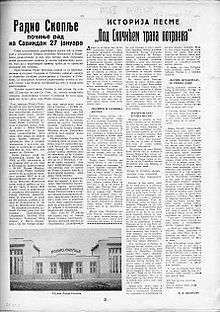Macedonian Radio Television
 | |
| Type | Broadcast national television network |
|---|---|
| Country | Macedonia |
| Availability | National; international (via MRT Sat) |
| Founded |
1941 (radio), 1964 (television) by 1941 and 1964 Government of Macedonia |
| Slogan | Ова е Македонска Радио Телевизија, ова е Македонија (This is Macedonian Radio Television, this is Macedonia) |
| Owner | Non-governmental Organization. |
Launch date | 14 December 1964 |
Former names | Радио Телевизија Скопје (РТС) |
Former affiliations |
Federal Broadcasting (JRT) (1944-1993) |
Official website | www.mrt.mk |
Macedonian Radio Television (Macedonian: Македонска радио телевизија, transliteration: Makedonska radio televizija) (or MRT) is the public broadcasting organization of the Republic of Macedonia. It was founded in 1993 by the Assembly of the Republic of Macedonia. Its legally defined service is the production and broadcasting of radio and television programmes of all genres, which should satisfy the public information, cultural, educational and recreational needs of the people of the Republic of Macedonia.
MRT is directed by Petar Karanakov.[1] An industry outsider, Karanakov was selected for his independent politics and strong reputation for integrity and management. Karanakov supervises 1,200 MRT staffers.
Television
Macedonian Television broadcasts 73 hours of programmes daily on its three national terrestrial and two international satellite channels.
- Terrestrial
- MRT 1 broadcasts a continuous 24-hour programme.
- MRT 2 broadcasts programmes for the national minorities in the Republic of Macedonia. Albanian, Turkish, as well as programmes in Serbian, Romany, Vlach and Bosnian.
- MRT 3 will broadcast a new category of programmes yet to be announced.
- MRT Sobraniski Kanal was formed in 1991 as an experimental channel, but now it broadcasts the activities from the Assembly of the Republic of Macedonia.
- MRT Sobraniski Kanal HD simulcasts the programme of MRT Sobraniski Kanal in HD quality.
- Satellite
- MRT Sat started in 2000 and broadcasts a continuous 24-hour programme, which are a selection of programmes from MRT, as well as its original programme of 5 hours. The station also broadcasts to Australia & New Zealand through the Optus D2 Satellite via UBI World TV.
- MRT 2 Sat was introduced in 2012 and broadcasts a continuous 24-hour programme in Albanian language.
Radio


The framework of the Macedonian Radio consists of three national channels, a satellite channel and a non-profit regional channel. It broadcasts 86.5 hours of programmes daily on its national and satellite channels.
The First channel, Radio Skopje, broadcasts a continuous 24-hour programme. It mainly functions as a talk radio.
The Second channel, Radio 2, broadcasts a continuous 24-hour programme, too. It is focused on popular music and entertainment.
The Third channel of Radio Skopje, broadcasts programmes in all the languages of the national minorities in the Republic of Macedonia, including Albanian (since 1948); Turkish (since 1945) 5 hours; Vlach (since 1991); Romany (since 1991); Serbian (since 2003) and Bosnian (since 2003) all 30 minutes each per day.
The satellite channel, Radio Macedonia, commenced in July 2003, and broadcasts a 24-hour continual programme, which is a selection of programmes from Macedonian Radio and its original programme "Radio Macedonia" with a duration of 6 hours and 30 minutes.
Kanal 103 provides FM broadcasting only for the region of Skopje with the mission of promoting avantgarde music and culture.
Macedonian Radio also broadcasts its programme over the Internet.
History
The work of Macedonian Radio began on 27 January 1941, under the name of Radio Skoplje, and during World War II (in 1944) as Radio Skopje with the live broadcast of the Second Session of ASNOM (the highest legislative body of the newly formed state). This date is celebrated as MRT day.
In 1993 Macedonian Radio and Television separated from the association of Yugoslav radio and television broadcasters. In July 1993, MRT was admitted as a full active member of the European Broadcasting Union. As a result of a naming dispute with Greece of the 'Macedonia' name, MRT was admitted only under the acronym: MKRTV.
With the enactment of new broadcasting law on 24 April 1997, Macedonian Radio and Television was split into two parts: Macedonian radio-diffusion and Macedonian Radio-Television. According to article 77 of the broadcasting law, 61% of the collected broadcasting tax belongs to Macedonian Radio Television.
Management
The process of transformation of MRTV in a public service broadcaster is not yet completed; it entailed the 1997 Law on Broadcasting Activities and the 2005 Broadcast Law. Editorial independence of MRTV is guaranteed by law but de facto lacking due to lack of independent funding and lack of independence of MRTV managerial bodies. MRTV executive directors in the last ten years remained close to the party in power. The network is funded by a license fee as well as by public budget contributions and advertising revenues (limited to 10% of airtime). Budgetary needs, and the practice of ad hoc state budgetary funding, has created a "culture of dependence" in MRTV.[2]:16
MRTV is supervised by the MRTV Council, whose members are appointed by the Parliament upon proposal by "authorised nominators" from civil society. The Council then elects the members of MRTV Management Board. Although formally only accountable to the legislature through its annual report and budget plan, MRTV remains informally accountable to the executive, undermining institutional autonomy. [3] MRTV also risks neglecting cultural pluralism obligations, in terms of programmes for minorities, as well as lacking impartiality and distance from government/majority politicians.[2]:16
See also
References
- ↑
- 1 2 Elda Brogi, Alina Dobreva, and Pier Luigi Parcu, "Freedom of Media in the Western Balkans", study for the European Parliament's Subcommittee on Human Rights, October 2014, EXPO/B/DROI/2013/16
- ↑ Macedonian Institute for Media (2010), Analysis of the Public Broadcasting in the Republic of Macedonia in the Context of the European Media Policy. Skopje.